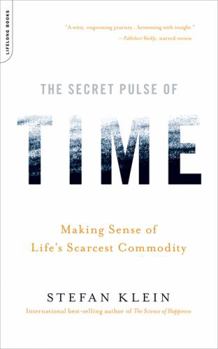The Secret Pulse of Time: Making Sense of Life's Scarcest Commodity
Select Format
Select Condition 
Book Overview
Have you ever fantasized about having more time-now, this minute, to accomplish everything you need and want to get done today? Or wondered why time flies when you are thoroughly engrossed in something? Or why minutes pass so slowly when you're standing in line at the store or airport, or on hold waiting for a customer service rep to answer your call? Or how, simply, to find more time to relax and unwind? Now, with The Secret Pulse of Time,...
Format:Paperback
Language:English
ISBN:0738212563
ISBN13:9780738212562
Release Date:February 2009
Publisher:Da Capo Lifelong Books
Length:368 Pages
Weight:0.95 lbs.
Dimensions:1.1" x 5.0" x 7.8"
Customer Reviews
4 ratings
A good exploration of time
Published by Thriftbooks.com User , 14 years ago
The Secret Pulse of Time is a very interesting book that looks at time from a number of angles, most notably cultural and neuroscience angles. I found it to be a refreshing read because it didn't focus on the conventional approach, which is usually physics, but actually delved into other disciplines and there take on time. The author also provided some excellent examples to back up what he was discussing. I found some of his thoughts on information overload particularly relevant, especially with the advent of social media. I highly recommend this book.
Nice primer on a dense topic
Published by Thriftbooks.com User , 16 years ago
About: A primer on everything you wanted to know about time and how humans use and perceive it. Some things I thought were cool: Time flies when we're having fun because we don't pay attention to time cues Every cell in our body has its own "clock" City dwellers move, speak and react faster than country folk Humans are very poor judges of long lengths of time After 200mg of caffeine, people judge time durations as 50% shorter than usual Racers start with a shot because we react more quickly to sound than light Humans are very, very poor at multitasking as our brains are not adept at switching gears Taught time management techniques normally don't stick for a long time Pros: Very interesting and makes difficult concepts mostly easy to follow. Highlights include spatial hearing, why folks are night owls or morning people, how time is related to stress, memory and attention. Cons: Dense. A few topics can get confusing. Grade: B+
Excellent, authoritative reading
Published by Thriftbooks.com User , 16 years ago
THE SECRET PULSE OF TIME: MAKING SENSE OF LIFE'S SCARCEST COMMODITY explores many time-related issues, from why some folks are morning people and others function best nights, why time either races or crawls, and other perceptions of time, memory, and efficiency. Stefan Klein is one of Europe's leading science journalists and writers, so his scientific perspective on the nature and function of time in society and in personal life makes for excellent, authoritative reading for not only college-level science and psychology collections, but for general-interest libraries who will find it lively enough for easy circulation and lay reader interest. Diane C. Donovan California Bookwatch
A fascinating book
Published by Thriftbooks.com User , 16 years ago
The Secret Pulse of Time is a very informative and interesting book. It is in part a discussion of what time is and what it isn't, part a discussion of how humans perceive and measure time, and part self help book. I've read books on the physics and philosophy of time before and certainly found this to be accurate to the extent that I understood the more complex books on the topic. For those who would like an introduction to the "problem" of time, this one is very lucid with respect to what is known about the physics of the phenomenon. It will surely surprise anyone who has not read anything on the topic to learn what is believed by qualified scientists about it. I know it was to me. Much of what Stefan Klein writes about our personal perception of time, what it is, how it "flows," why it seems to be unidirectional, is very well researched. Certainly his explanation of the various "times" that our body senses seems logical once contemplated. It was very interesting, not to mention unsettling, to read about the experiments into how the body perceives the passage of time even in an unfamiliar environment without direct resort to the sun and its clues regarding it. Taking our biological cues, even down to cellular level and specific brain regions, the author shows the reader just how we know the various times that dictate our behavior. He also reflects on how the concept of it and the degree to which it is narrowly specified has changed as technology and our cultural needs have changed over the millennia. From what he tells us even the need to measure it has evolved considerably since the 15th century and the Age of Exploration. At times I found the author's concepts of the expansion and contraction of experienced time somewhat confusing. Feeling the need myself to play with it, I found his suggestions at first difficult to put into practice; however after a reflection on my own experiences in the past with "delaying" or "hastening" its passage, I found what he suggested made a good deal of sense. Some of the issues in my own situation will definitely benefit from his self-help section! A fascinating account.




